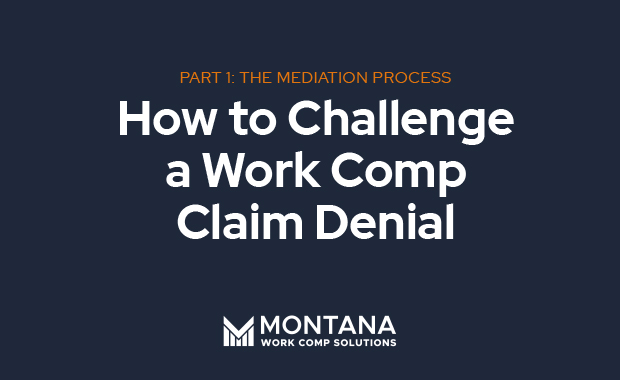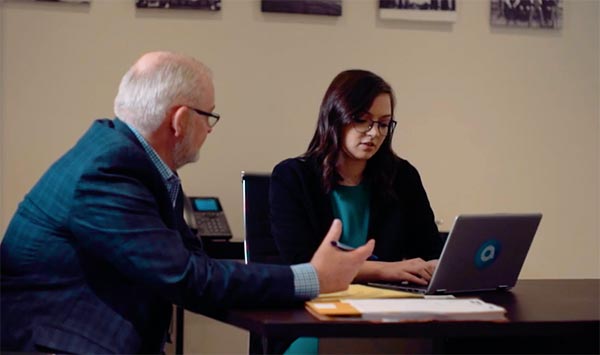Work comp insurers are eager to deny your claim! According to the Montana Department of Labor and Industry, 38% of claims were DENIED during the fiscal year 2017. This article is the first of five that discuss how you handle a denied claim if you are a claimant.
Think of it this way. If an insurer denies 10 claims, maybe they end up accept 2 or 3 of those later. What happens to the other 7 or 8? Maybe one will fight the denial and win, one or two more will fight and lose. In reality, the majority will just give up quickly and the insurer never hears from them again. It’s a bit like a Vegas casino. The casino always win even when a few lucky ones hit the jackpot.
But here’s the truth about denials – you can defeat lot of common defenses with some specific information. This requires understanding the reason for a defense and what information you need to defeat it. There are a lot of reasons your claim might get denied, but unless the defense is whether you were actually an employee or not, you can win against these defenses.
There may be several reasons that your claim got denied. The denial letter should specifically tell you why your claim was denied. The letter should also inform you that you have a right to mediate the claim if you don’t agree with the decision. This denial letter means that the adjuster will not pay your medical bills, and you will not receive any checks.
Read the letter carefully, though, because sometimes the claim is denied because the adjuster hasn’t received the information they have requested. When the information arrives, the adjuster may review your case again and reach a different conclusion. If that’s the case, be sure to follow up so you know what information is missing and can try to get that information to the adjuster.
Finally, don’t sit on your hands and hope that things will work out if you get a denial. You should challenge the denial through mediation or try to settle your case.
How do I Challenge a Denial?
You can challenge the denial of your claim by filing for mediation. If you disagree with the denial, you have the right to mediate the claim. The contact information for the Montana Department of Labor and Industry Mediation should be in the letter. If it’s not, you can find it online at: Work Comp Mediation Petition .
Mediation and the Mediation Process
It is important to understand that the law sets up a process to help you work through things when the adjuster denies something you think you should get. Any time an adjuster denies a claim, benefit, bill, or procedure, they should provide you with written notice of that decision and usually a short explanation of the basis for that decision.
As part of that communication, there should also be a paragraph informing you that you have the right to dispute the decision by filing a mediation petition. The same paragraph should include a phone number, address, or website where you can get the forms and instructions you will need to file mediation.
The adjuster won’t file mediation for you – you have to fill out the form and send it back to the Montana Department of Labor and Industry yourself.
The form will ask you the basic claim information as well as ask you to describe the dispute, what you’ve done to try to resolve it, and what the insurer did in response.
Once filed, the Department will send you a notice telling the date of the mediation. The mediation process through the Department is free. A neutral mediator from the Department’s staff will get the claim and conduct the mediation over the phone.
If you don’t have an attorney, the mediator may call you ahead of time and explain the process to you. In general, you will go first and explain to the mediator and the insurer what you are disputing and why you think you are entitled to your request. The insurer will respond, and then the mediator will help the parties go back and forth, talking to find a solution to the problem.
How to Talk to the Mediator
The mediator is neutral. They don’t care who wins. They try to push the idea of resolution. You can talk openly to the mediator, but be sure to tell the mediator if you don’t want the information shared. If there is a part of the decision you don’t understand, sometimes you can ask the mediator to explain it. Often, the mediator will give you a basic understanding of what the problem is and what you might be able to get done in mediation. Always be polite–especially to the mediator. Mediators work with the adjusters and the defense attorneys every day. They are in a position to help you.
Understand that the mediator is not the same as a judge.
The recommendation the mediator makes is only a suggestion. It may be helpful for you to understand how the adjuster came to their conclusions. It might also be beneficial to get a better idea of what your chances are of reversing the decision. The main thing to remember is that this not a court ruling. It is not binding. If either party disagrees with the mediator’s recommendation, they can reject it. In every case involving a dispute over benefits, you must go through the mediation process before you go to the Workers’ Compensation Court. If you don’t, the Court won’t hear your case.
If the parties reach an agreement, the mediator will issue a Notice of Resolution. If the parties cannot reach an agreement, the mediator typically has 10 business days to issue a Report and Recommendation. Once that is issued, you have 25 days to respond to the report.
When you are mediating a case involving a denied claim, there are only two different results. Either your claim will settle on a disputed basis, or the insurer will continue to deny your claim.
Common Denials: Denied for Failing to Provide a 30-day notice to Your Employer
The key questions when counting up the 30 days are:
- When did you first go to the doctor?
- Is your condition the result of an injury or an occupational disease?
- Did you supervisor or employer actually know about the accident and injury?
- Did your supervisor or employer discourage you from filing or suggest you put it on your health insurance?
If you have suffered an injury, you only have thirty (30) days from the date you knew you were injured to tell your employer. It’s a harsh rule but has some soft spots. First, the clock may not start running until you see a doctor who identifies that you had an actual injury. If it is a condition that may not be obvious to you, it may be what’s called a “latent” injury. Until a doctor diagnoses an injury or condition, the clock may start running.
If your claim is based on a condition that qualifies as an “occupational disease” – harm that is the result of work activities that occurred on more than one work shift, there is no requirement that it be reported to the employer within 30 days.
Actual knowledge is also a defense to the 30 day notice argument. If the employer has actual knowledge of the injury within 30 days, you met the requirement. If you can prove that the employer knew of the accident or the injury or you gave them all the information about the accident and injury, it should be enough. The definition of an employer is also broad. It starts with your direct supervisor and moves up the chain to the owner.
Sometimes, an employer will suggest to file it on your health insurance instead. Where an employer provides employees with an incentive not to report work injuries, encourages a worker to file it as a non-work-related claim with health insurer, or says it will “take care of everything,” the employer and insurer may not be able to assert a 30 day notice defense.
Common Denials: You were denied based on Your Failure to File a Claim within One Year from When You Knew or Should Have Known that you had an Occupational Disease
The notice requirement for an occupational disease is one year from the time you “knew or should have known.” This sounds like an easy standard to apply against you, and many adjusters think it is. It is NOT.
ALWAYS challenge this defense based on whether the doctor used the words “occupational disease.” Ask the adjuster to explain they applied the “Dvorak” and “Rosling” cases to your case.
Despite what the language of the act says, the Montana Supreme Court and the Workers’ Compensation Court have interpreted this in a way that makes it very difficult to deny a case for this reason. In most cases, you must have gone to the doctor, and that doctor must have specifically told you that you had an occupational disease. In cases where the disease arises from exposure to toxic substances like asbestos, the doctor would have to base that conclusion on specific findings from tests of the site.
Most adjusters will simply ask, “When did you know?” and if it was more than a year before you filed your claim, the adjuster denies it. Another approach is to find out when you were diagnosed. If you filed your claim more than a year after the diagnosis, they deny the claim.
Common Denials: Denial Based on “No Objective Medical Findings”
Another common reason for denying the claim is the allegation that there are “no objective medical findings” to support an injury. Adjusters want you to think that your claim requires something very specific, like an x-ray or an MRI, to demonstrate an injury. This is an overused defense.
Doctors rely on “clinical findings” to make a diagnosis and “clinical findings” meet the definition of “objective medical findings” in nearly every case.
The term “objective medical findings” is broad and includes those tests, but it also includes the phrase “other clinical findings.” “Other clinical findings” are basically anything the doctor concludes after examining you. Even the smallest finding – a bruise, tenderness, etc. may qualify as an objective medical finding.
If you face this challenge, ask your doctor what “clinical findings” the doctor used to reach the diagnosis.
THE TAKE AWAY: Insurers deny a lot of a claims – more than a third of all claims are denied. But you don’t have to walk away. In many cases, you can successfully fight back against a claim denial by asking the right questions and understanding what facts are important.


